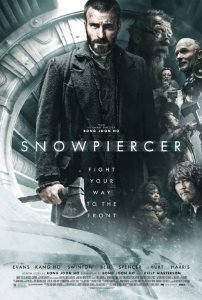 “Politicians should read science fiction, not westerns and detective stories.” –Arthur C. Clarke
“Politicians should read science fiction, not westerns and detective stories.” –Arthur C. Clarke
Science fiction is, almost without fail, either set in the future or an unknown universe. This allows the author, or filmmaker, to turn blank pages and screens into whatever he or she wishes. Without the baggage of now, science fiction often comments on the present by portraying current realities, at least thematically, within a new context, thereby forcing readers and audiences to ponder anew. Battlestar Gallactica (the most recent iteration, not the one that haunted my childhood) examined the nature of war, terrorism, morality, humanity, and technology against the backdrop of a war between humans and the robots they created. Star Trek (the original iteration, not the one that haunts my adulthood), among other things, tugged at the complexities of race, civil rights, and the possibility of unity, even as its characters explored the final frontier.
Snowpiercer takes up this mantle even more directly. Set in the near future, after a global calamity renders the earth uninhabitable due to extreme cold, the tale unwinds on a train that houses all of what is left of humanity. A perpetual engine machine designed by Wilford (Ed Harris), the train is literally and figuratively segmented between those who have–sushi, parties, school, pools, and eggs–and those who have not–dignity, worth, and showers. There is little peace between the front and the back, and guards are always on hand to quell any unrest. Whenever anything untoward happens, Mason (played almost unrecognizably, yet gloriously, by Tilda Swinton) tells the tailies they must “keep their place.” While all are necessary to maintain the delicate ecosystem, the fragility only persists because roles and expectations are fulfilled. Understandably, this sort of twaddle does little to salve the deprivations suffered by the underclass. Led by Curtis (Chris Evans) and Gilliam (John Hurd), the tail section revolts and is resisted by Mason and her minions. Violence by axe, spear, knife, and gun ensues. Blood spills. Torsos are impaled. Limbs are hacked. Jugulars are severed. Death visits and has a holiday.
In case the previous few sentences did not make it clear, Snowpiercer is not a rumination on the class system, at least not at heart. It is, instead, a bloody ballet, an action film with the trappings of Marx, not a philosophical treatise. As an action film, it is quite actiony. Joon-ho Bong, who wrote and directed the film, knows how to stage and record violence. Though it may be a sign of my own depravity, I enjoyed this element. The cinematography was clever. Not only did Bong imagine an axe fight in the dark, where only one side can see via night vision goggles, but he filmed it.
The philosophical trappings, though, make the film more interesting and reflective. Sometimes the symbols are a bit on the nose. For instance, at one point a member of the proletariat sacrifices his body in an effort to halt the machine (the train, a.k.a. “capitalist tyranny”). But as the train winds its way through a repetitive circuit, and as our intrepid revolutionaries work their way toward the front of the train, the juxtaposition between the back, where everyone is grimy and unkempt, and the front, where children sing songs, suits are tailored, and booties are shaken as if the festivities never stop, is appropriately jarring. The wonder and awe written across their faces, as they absorb how the other half truly lives, is sometimes campy and other times wrenching, but always effective.
Though the persistence of inequality in our society should not be ignored, the condition portrayed in Snowpiercer is enforced in such a manner that comparisons between the epochs are hollow and unpersuasive. We have no over-arching, militarized system that physically prevents progress. And though we are all born somewhere, and where we are born certainly shapes who we are and what we become, in Snowpiercer your section of the train is inviolable, a trap from which escape is indeed impossible, in spite of talent or dedication or virtue. Surely some would disagree with my contentions. For “tailies” in the real world, the system might feel militant and birth may feel determinative. To a degree, this is understandable.
The Marxism that imbues Snowpiercer is more drizzle than dogma, so it is not so heavy-handed that it ruins the film. Also, as with Marx, solutions it proffers are at least as ruinous as the system it hopes to depose. This naïveté renders the film’s philosophy as moot. Perhaps by refusing to answer the questions fully, Snowpiercer, in its more thoughtful frames, understands the futility of what it proposes.
In the end, Snowpiercer is violent, ragged, and interesting. Whether you swallow Marx, like the purple gelatin-like substance the tailies eat, or you spit it out, as it so richly deserves, you can enjoy this spectacle.
Final Grade: 2/3 Eggheads
 Bert Wheeler
Bert Wheeler
 Jeff Haymond
Jeff Haymond
 Marc Clauson
Marc Clauson
 Mark Caleb Smith
Mark Caleb Smith
 Tom Mach
Tom Mach